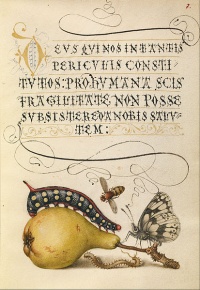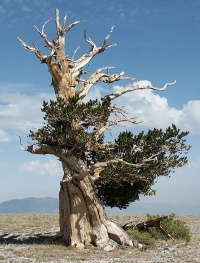Biology
From The Art and Popular Culture Encyclopedia

The 49th plate from Ernst Haeckel's Kunstformen der Natur of 1904, showing various sea anemones classified as Actiniae.
|
"Nothing in Biology Makes Sense Except in the Light of Evolution" "In the middle of the 20th century [...] philosophers started to move away from the long tradition of modernism [...], turned a blind eye to the implications of biology and [...] are showing unending and increasing interest in the obfuscations of Heidegger."--Philosophical Darwinism (1993) by Peter Munz "The rebirth of sociobiology [happened] in 1992 under a new name—evolutionary psychology. I date the rebirth to 1992 because that is when an influential volume appeared with the provocative title The Adapted Mind: Evolutionary Psychology and the Generation of Culture. [...] Morality (particularly cooperation and cheating) has been an important area of research in evolutionary psychology since the beginning."--The Righteous Mind (2012) by Jonathan Haidt |


|
Related e |
|
Featured: |
Biology (from Greek: βίος, bio, "life"; and λόγος, logos, "knowledge") is the study of life. It contains such topics as classifying the various forms of organisms, how species come into existence, and the interactions they have with each other and with the natural environment. Biology encompasses a broad spectrum of academic fields that are often viewed as independent disciplines. However, together they address phenomena related to living organisms (biological phenomena) over a wide range of disciplines, many of which, for example, botany, zoology, and medicine are considered ancient fields of study.
Contents |
Evolution
A central organizing concept in biology is that life changes and develops through evolution and that all lifeforms known have a common origin (see Common descent). This has led to the striking similarity of units and processes discussed in the previous section. Introduced into the scientific lexicon by Jean-Baptiste de Lamarck in 1809,Charles Darwin established evolution fifty years later as a viable theory by articulating its driving force, natural selection (Alfred Russel Wallace is recognized as the co-discoverer of this concept as he helped research and experiment with the concept of evolution). Darwin theorized that species and breeds developed through the processes of natural selection as well as by artificial selection or selective breeding. Genetic drift was embraced as an additional mechanism of evolutionary development in the modern synthesis of the theory.
The evolutionary history of the species— which describes the characteristics of the various species from which it descended— together with its genealogical relationship to every other species is called its phylogeny. Widely varied approaches to biology generate information about phylogeny. These include the comparisons of DNA sequences conducted within molecular biology or genomics, and comparisons of fossils or other records of ancient organisms in paleontology. Biologists organize and analyze evolutionary relationships through various methods, including phylogenetics, phenetics, and cladistics. For a summary of major events in the evolution of life as currently understood by biologists, see evolutionary timeline.
Up into the 19th century, it was commonly believed that life forms could appear spontaneously under certain conditions (see spontaneous generation). This misconception was challenged by William Harvey's diction that "all life [is] from [an] egg" (from the Latin "Omne vivum ex ovo"), a foundational concept of modern biology. It simply means that there is an unbroken continuity of life from its initial origin to the present time.
A group of organisms share a common descent if they share a common ancestor. All organisms on the Earth both living and extinct have been or are descended from a common ancestor or an ancestral gene pool. This last universal common ancestor of all organisms is believed to have appeared about 3.5 billion years ago. Biologists generally regard the universality of the genetic code as definitive evidence in favor of the theory of universal common descent (UCD) for all bacteria, archaea, and eukaryotes (see: origin of life).
Evolution does not always give rise to progressively more complex organisms. For example, the process of dysgenics has been observed among the human population.
List of biology topics
Fields and disciplines
- Biological horror
- Feminist biology
- Natural history
- History of agriculture
- History of medicine
- History of anatomy
- History of evolutionary thought
- History of genetics
- Reproduction
- Seed
- Plant communication
- Plant sensation
- Sociobiology
Publications
- List of important publications in biology
- On Generation and Corruption
- Historia Plantarum
- De humani corporis fabrica
- Systema Naturae
- Vestiges of Creation
- The Origin of Species
- The Descent of Man
Theories and concepts
- Biology and sexual orientation
- Spontaneous generation
- Great chain of being
- Lamarckism
- Darwinism
- Germ theory of disease
- Recapitulation theory, the idea that ontogeny recapitulates phylogeny
- Hierarchy of life
Influential figures
- Aristotle
- Andreas Vesalius
- William Harvey
- Antonie van Leeuwenhoek
- Carolus Linnaeus
- Georges-Louis Leclerc, Comte de Buffon
- Jean-Baptiste Lamarck
- Alexander von Humboldt
- Charles Lyell
- Charles Darwin
- Alfred Russel Wallace
- Gregor Mendel
- Louis Pasteur
- Robert Koch
- Ernst Haeckel
- Ivan Pavlov
- Konrad Lorenz
- Ernst Mayr
- Stephen Jay Gould
- Jane Goodall
General
- History of science
- History of medicine
- Philosophy of biology
- Natural philosophy
- Natural theology
- Humboldtian science
- Relationship between religion and science
- Eugenics
Biology books
- The Botany of Desire (2001) Michael Pollan
See also

